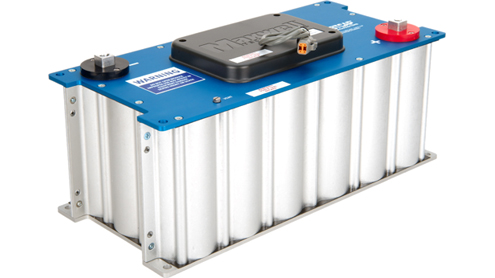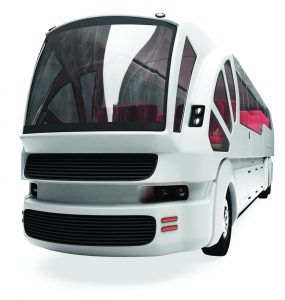
Maxwell Technologies ultracapacitors power 5000 buses worldwide
By David Hubbard

Maxwell Technologies, San Diego, CA, says its UC-based ultracapacitors operate in approximately 5000 buses worldwide with approximately 3000 to 4000 buses in China. In the Chinese market, Maxwell UC-based hybrid buses account for 60 to 70 percent share, with battery-based hybrid buses accounting for approximately 30 to 40 percent share. Last year, 25 cities were operating buses with Maxwell ultracapacitor systems in service. The company expects more in 2013.
Ultracapacitors can complement batteries or replace them altogether in buses and trucks. Unlike batteries, which produce and store energy by means of a chemical reaction, ultracapacitors store energy in an electric field. This electrostatic energy storage mechanism enables ultracapacitors to charge and discharge in as little as fractions of a second, perform normally over a broad temperature range (-40 to +65 degrees Celsius), operate reliably through one million or more charge/discharge cycles and resist shock and vibration. Maxwell offers ultracapacitor cells ranging in capacitance from one to 3,000 farads and multi-cell modules ranging from 16 to 125 volts.
Zhengzhou Yutong Bus Co., Ltd. (Yutong), Zhengzhou, Henan Province, China’s largest bus manufacturer, selected Maxwell ultracapacitors for energy storage and power delivery in the diesel-electric hybrid buses it produces for public transit agencies worldwide.
Yutong’s hybrid drive system incorporates 16 of Maxwell’s 48-volt ultracapacitor modules to support braking energy recuperation and torque assist functions. They enable hybrid transit buses to achieve fuel savings and reduce CO2 emission reduction by approximately 25 percent, as well as 90 percent reduced particulate emissions compared to conventional diesel buses.
“This opportunity to work closely with a world leader in transportation technology is helping us to better understand the requirements of hybrid-electric vehicles,” says David Schramm, Maxwell president and CEO. “Yutong has developed an innovative hybrid drive system for efficient, environmentally friendly transit buses and other heavy vehicles, allowing us to continue optimizing our products.”
Maxwell Technologies does its module and cell testing for use in hybrid buses at North Vehicle Quality Supervision and Qualification Test Lab, affiliated with China North Vehicle Research Institute.
Regenerative braking
Maxwell ultracapacitors can absorb and store virtually all kinetic energy from a braking system. The emission-free stored electrical energy in ultracapacitors is then available to assist in acceleration, reduce fuel consumption and accompanying emissions or battery drain, as well as power the air conditioner, operate power steering or perform other electrical functions. Regenerative braking also takes most of the load off mechanical brakes, reducing brake maintenance and replacement expenses.
Start-stop technology
Start-stop technology enables the engine in conventional, electric or hybrid-electric delivery trucks and refuse vehicles to shut down when they come to a stop at a red light, picking up or dropping off passengers, or when sitting in traffic. Maxwell Technologies ultracapacitors then provide a short burst of energy that restarts the motor.

Bus starter systems
Maxwell Technologies says its ultracapacitors prevent lost down time due to no-start, overnight “hotel” loads, and are especially beneficial for heavy-duty vehicles in cold climates or that require repetitive starts. Trucks place heavy demand on energy storage devices and depend on the reliability of ultracapacitors. According to the company, however, the real benefit comes in removing up to three lead acid batteries, freeing up under-hood and step-well space, enabling load stabilization and preventing “brown out.” Starter systems for buses in cold climates eliminate morning idle heat-up and the cost of jump-starting.
As design engineers have found, batteries have high energy capability while the ultracapacitors have high power capability. In an optimal hybrid alternative drive system, both technologies could combine in a way that maximizes the benefits of both.
Maxwell Technologies says it offers the most comprehensive ultracapacitor product line for the transportation industry. The company says its 125V Heavy Transportation Module stores more energy per unit volume, delivers more power per unit volume and weight, and lasts longer than most commercially available ultracapacitors. BR
A few points about ultracapacitors
Ultracapacitors are made by coating two metal foil electrodes in carbon — because of its high surface area-to-volume ratio — separating them with a thin piece of paper and then immersing these two coated metals in a liquid electrolyte. These sometimes weave together carbon fiber threads. This essentially functions as two capacitors in a series, which is why ultracapacitors have such a higher energy and power density than traditional capacitors and batteries. Because of their ability to pass large amounts of current in a short amount of time, they are extremely valuable when extra boost is required.
An ultracapacitor takes .3 to 30 seconds to charge or discharge. This charge time is nearly 500 times faster than that of lead acid batteries. However, its discharge time is about 1,000 times faster.
Long cycle capabilities are another valuable feature of ultracapacitors. Most lead acid batteries can maintain a life cycle from 500 to 1,000 charges and discharges, but ultracapacitors can be cycled through at least 500,000 times. This reduces the frequency of changes of the energy source, which is costly and environmentally detrimental for batteries.
The major downside to relying heavily on ultracapacitors lies in their low energy density. The achievable range on a single charge is not tremendous. This is why placing ultracapacitors in series is so critical to increasing their voltage output. BR
